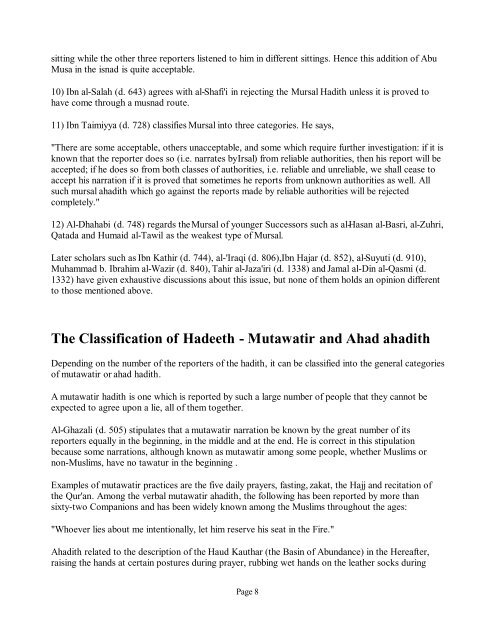Rules Governing The Criticism Of Hadith - Islam House
Rules Governing The Criticism Of Hadith - Islam House
Rules Governing The Criticism Of Hadith - Islam House
You also want an ePaper? Increase the reach of your titles
YUMPU automatically turns print PDFs into web optimized ePapers that Google loves.
sitting while the other three reporters listened to him in different sittings. Hence this addition of Abu<br />
Musa in the isnad is quite acceptable.<br />
10) Ibn al-Salah (d. 643) agrees with al-Shafi'i in rejecting the Mursal <strong>Hadith</strong> unless it is proved to<br />
have come through a musnad route.<br />
11) Ibn Taimiyya (d. 728) classifies Mursal into three categories. He says,<br />
"<strong>The</strong>re are some acceptable, others unacceptable, and some which require further investigation: if it is<br />
known that the reporter does so (i.e. narrates by Irsal) from reliable authorities, then his report will be<br />
accepted; if he does so from both classes of authorities, i.e. reliable and unreliable, we shall cease to<br />
accept his narration if it is proved that sometimes he reports from unknown authorities as well. All<br />
such mursal ahadith which go against the reports made by reliable authorities will be rejected<br />
completely."<br />
12) Al-Dhahabi (d. 748) regards the Mursal of younger Successors such as al-Hasan al-Basri, al-Zuhri,<br />
Qatada and Humaid al-Tawil as the weakest type of Mursal.<br />
Later scholars such as Ibn Kathir (d. 744), al-'Iraqi (d. 806), Ibn Hajar (d. 852), al-Suyuti (d. 910),<br />
Muhammad b. Ibrahim al-Wazir (d. 840), Tahir al-Jaza'iri (d. 1338) and Jamal al-Din al-Qasmi (d.<br />
1332) have given exhaustive discussions about this issue, but none of them holds an opinion different<br />
to those mentioned above.<br />
<strong>The</strong> Classification of Hadeeth - Mutawatir and Ahad ahadith<br />
Depending on the number of the reporters of the hadith, it can be classified into the general categories<br />
of mutawatir or ahad hadith.<br />
A mutawatir hadith is one which is reported by such a large number of people that they cannot be<br />
expected to agree upon a lie, all of them together.<br />
Al-Ghazali (d. 505) stipulates that a mutawatir narration be known by the great number of its<br />
reporters equally in the beginning, in the middle and at the end. He is correct in this stipulation<br />
because some narrations, although known as mutawatir among some people, whether Muslims or<br />
non-Muslims, have no tawatur in the beginning .<br />
Examples of mutawatir practices are the five daily prayers, fasting, zakat, the Hajj and recitation of<br />
the Qur'an. Among the verbal mutawatir ahadith, the following has been reported by more than<br />
sixty-two Companions and has been widely known among the Muslims throughout the ages:<br />
"Whoever lies about me intentionally, let him reserve his seat in the Fire."<br />
Ahadith related to the description of the Haud Kauthar (the Basin of Abundance) in the Hereafter,<br />
raising the hands at certain postures during prayer, rubbing wet hands on the leather socks during<br />
Page 8

















